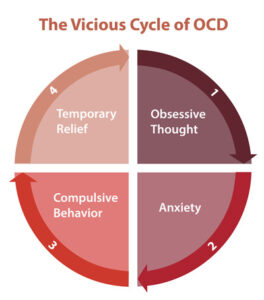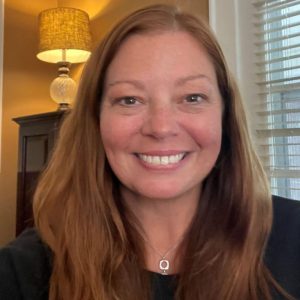Date: Monday, February 19, 2024
Time: 12-2pm ET
Format: Hybrid
-
- Livestream via Zoom, or
- In person: UNC School of Social Work, 325 Pittsboro Street, Chapel Hill, NC 27516
CE: 2 CEs total, read for more information on CEs
Fee: $35, read for more information on fees and scholarships
 Program Description:
Program Description:
In this workshop, Jenny Smith will unpack obsessive-compulsive disorder, its varied presentations, and its functions for clients. Participants will learn strengths-based methods to help clients who experience recurring thoughts and behaviors to gain insight and flexibility in their response. She will walk us through a biopsychosocial assessment with case examples and share tools, checklists, and behavioral strategies for treating OCD. Her workshop will draw from exposure response prevention, cognitive behavioral, acceptance, and mindfulness approaches and emphasize ways to tailor treatment to the varied needs of diverse clients. This includes being able to decipher when behaviors reflect cultural norms rather than pathology.
Trainer:  Jenny Tharpe Smith, Ed.S., LCSW-S, LISW-CP – Jenny Tharpe Smith (she/her/hers) is a licensed clinical social worker and supervisor with more than 25 years of experience in juvenile justice, departments of social services (child welfare, intensive in home, and post adoptions), private practice, and higher education (counseling and wellness services/administrator). Prior to joining UNC-Chapel Hill’s School of Social Work, she spent 15 years in a university setting as the associate dean of students and director of counseling services at Lenoir Rhyne University. During her time there, she established an integrative health and wellness center for students that included counseling, disability, and student health services. She currently is in private practice with Redfish Counseling and is a Clinical Assistant Professor and Field Faculty with UNC’s 3-Year Winston-Salem MSW Program.
Jenny Tharpe Smith, Ed.S., LCSW-S, LISW-CP – Jenny Tharpe Smith (she/her/hers) is a licensed clinical social worker and supervisor with more than 25 years of experience in juvenile justice, departments of social services (child welfare, intensive in home, and post adoptions), private practice, and higher education (counseling and wellness services/administrator). Prior to joining UNC-Chapel Hill’s School of Social Work, she spent 15 years in a university setting as the associate dean of students and director of counseling services at Lenoir Rhyne University. During her time there, she established an integrative health and wellness center for students that included counseling, disability, and student health services. She currently is in private practice with Redfish Counseling and is a Clinical Assistant Professor and Field Faculty with UNC’s 3-Year Winston-Salem MSW Program.
Learning Objectives:
At the conclusion of this program, participants will be able to:
- Describe at least 1 way that OCD functions as a coping strategy to avoid discomfort, unwanted thoughts and situations.
- Identify at least 1 OCD screening tool for use in clinical practice.
- Explain and create a SUDs hierarchy as part of Exposure Response Prevention.
- List and apply at least 2 practices to help clinicians identify behavior that is consistent with norms in client culture that may differ from that of the practitioner.
References:
- Hellberg, S. N., Buchholz, J. L., Twohig, M. P., & Abramowitz, J. S. (2020). Not just thinking, but believing: Obsessive beliefs and domains of cognitive fusion in the prediction of OCD symptom dimensions. Clinical Psychology and Psychotherapy, 27(1), 69-78. https://doi.org/10.1002/cpp.2409
- Homonoff, Z., & Sciutto, M. J. (2019). The effects of obsession type and diagnostic label on OCD stigma. Journal of Obsessive-Compulsive and Related Disorders, 23 https://doi.org/10.1016/j.jocrd.2019.100484
- Williams, M. T., Rouleau, T. M., La Torre, J. T., & Sharif, N. (2020). Cultural competency in the treatment of obsessive-compulsive disorder: Practitioner guidelines. Cognitive Behaviour Therapist, 13 https://doi.org/10.1017/S1754470X20000501
UNC Chapel Hill – Clinical Lecture Series Programs